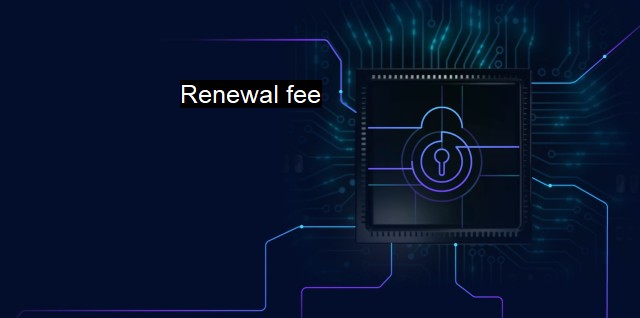What is Renewal fee?
Navigating Cybersecurity Renewal Fees: Understanding the Importance of Antivirus Subscription Renewals
Renewal Fee is a payment made to keep software, services, or programs operational after an initial contract or fixed period has expired. Within the field of cyber security and antivirus software solutions, the term mainly refers to the cost to continue utilizing these services.Given the increasing prominence of cyber threats many businesses and individuals opt to safeguard their important and confidential data against these unforeseen and alarming safety breaches by employing proactive cybersecurity measures. One such integral measure involves the use of antivirus software.
Antivirus, as the name suggests, is a computer software designed to combat and eradicate malicious programs or malware, such as Trojans, ransomware, spyware, adware, and viruses. this software isn't a 'set and forget' solution. It requires periodic and timely updates to address and neutralize new cyber threats effectively. It's here that the concept of a renewal fee becomes particularly relevant.
To keep up with changing cyber threats, antivirus software is updated and enhanced continuously to recognize and respond to new types of malicious software. This ongoing modification and development of antivirus programs often include the addition of new features or functionalities to improve performance. As expected, software providers incur continually to develop, test, and implement these antivirus updates. Consequently, antivirus users are charged a recurrent fee, known as a renewal fee, to continue benefitting from these updates and improvements and ensure that they are always defended against evolving cyber threats.
Antivirus software renewal fee is therefore an essential investment into preserving the integrity and security of digital systems and data. It is a payment made to maintain the validity of the software license beyond its initial validity period. The fee also ensures access to important updates, which allows the software to identify and neutralize newly evolving threats.
Historically, antivirus software often came packaged with computer hardware, with a free trial period included. Following the end of the trial period, users would have to pay a fee to maintain its service, the renewal fee. Presently, many antivirus providers offer various flexible subscription options to cater to diverse users' needs. While some users may opt for monthly subscriptions, others go for annual subscriptions, both of them at different costs. Opting for these subscriptions, essentially paying the renewal fee, ensures constant virus definition updates, real-time protection measures, and product support.
Failure to pay the renewal fee may result in lapses in these protections. Free or out-of-date antivirus software outnumbered by new threats, leaving systems vulnerable to hacks, data breaches, and various forms of malware. Fortunately, most providers remind users about the impending expiry dates well in advance and also offer a grace period to renew without any lapse in protection.
Some often critique the model of a renewal fee. With the rise of software as a service (SaaS), some argue that the payment of a renewal fee is an outdated and oblique way of charging users. Some critics argue that SaaS models, with their regular subscription fee, provide a more transparent payment method.
Companies argue that the renewal fee ensures users receive premium protection at a nominal cost instead of bearing the high costs of a potential cybersecurity threat. Many firms will also offer discounts for renewing the license instead of buying a new one while making it evident that the payment secures data for another fixed period.
a renewal fee for antivirus software is an essential expense in the world of cybersecurity. It ensures the longevity, effectiveness, and evolution of antivirus solutions, allowing systems and data to stay protected from the ever-growing and changing cyber threats. Without paying the renewal fee, users risk leaving their systems exposed to these potential threats, invariably resulting in data compromises. the renewal fee acts as a shield, continuously maintaining one's cyber fortress's walls.

Renewal fee FAQs
What is a renewal fee?
A renewal fee is a fee that is charged annually to continue using a product or service. In the context of cybersecurity and antivirus, it is the fee charged to continue receiving updates and protection against new threats.Why do I need to pay a renewal fee for my antivirus?
The renewal fee is necessary to ensure that your antivirus stays up-to-date and continues to protect you against the latest cybersecurity threats. The fee covers the cost of research and development to create new virus definitions and other security updates.How much is the renewal fee for antivirus software?
The cost of the renewal fee varies depending on the product, the level of protection offered, and the length of time for which you are renewing. It’s best to check with your antivirus provider for specific pricing information.What happens if I don't pay the renewal fee for my antivirus?
If you don’t pay the renewal fee for your antivirus, you will no longer receive updates or protection against new threats. This puts your computer and personal information at risk of being compromised by viruses and other malicious software. It is important to keep your antivirus up to date in order to maintain a secure computing environment.| | A | | | B | | | C | | | D | | | E | | | F | | | G | | | H | | | I | | | J | | | K | | | L | | | M | |
| | N | | | O | | | P | | | Q | | | R | | | S | | | T | | | U | | | V | | | W | | | X | | | Y | | | Z | |
| | 1 | | | 2 | | | 3 | | | 4 | | | 7 | | | 8 | | |||||||